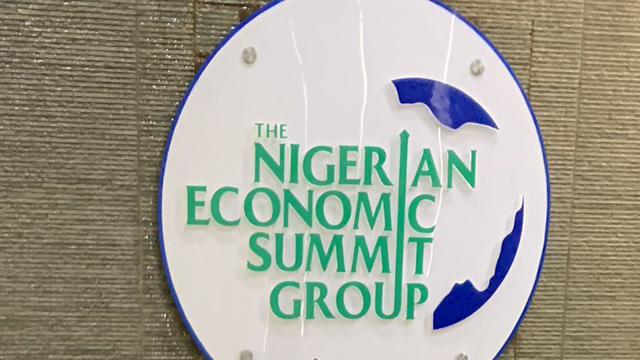
The Nigerian Economic Summit Group (NESG) has unveiled what it called the arc of the possible, a new strategy for driving Nigeria’s economic development.
The arc of the possible underscores the recalibration of stabilisation strategies to address emerging challenges, ensuring sustainable growth and enhanced living standards.
It highlights three pivotal reform priorities for 2025 which includes achieving stable and moderate inflation through strengthening fiscal discipline by boosting revenues through progressive tax reforms, reducing wasteful expenditures, and redirecting subsidy removal gains into targeted social programmes; enhancing the monetary policy transmission mechanism for sustainable price stability and lifting import bans and reducing tariffs on essential goods to address supply-side constraints and stabilise prices.
The other is boosting foreign exchange liquidity and stabilising forex rates by
streamlining trade processes, enhancing remittance inflows through digitalisation, and maintaining a credible monetary policy framework to build investor confidence and ensure exchange rate stability.
The third priority reform area according to the NESG is improving fiscal performance and reducing debt vulnerabilities. This is centred on revenue driven fiscal consolidation, reallocation of expenditures, and the use of non-debt financing mechanisms (e.g. public-private-partnership, PPPs) to reduce debt levels and promote fiscal stability.
The present administration had upon assumption of office embarked on some reform initiatives including removal of fuel subsidy, unification of the exchange rates and also embarked on tax reform that it hoped would boost the country’s revenue base and support local businesses.
Though the reforms were meant to create a stable macroeconomic environment conducive to investments, job creation, and poverty alleviation, they have produced unintended outcomes as the cost of living has escalated, increasing the poverty index as households and businesses struggle to survive.
Speaking at the unveiling of the new strategies during a media interactive session in Abuja, CEO of NESG, Dr. Tayo Aduloju said with clear targets across key sectors in the short to medium term, the strategy underscores NESG’s commitment to actionable solutions that unlock growth and prosperity.
He noted that while the reforms were good in themselves, the danger is that a sub-optimal policy execution or reform reversals, will lead to economic stagnation and heightened vulnerabilities.
The new strategy proposed by the NESG is anchored on institutionalising the capability to promote six reform principles including commitment to a competitive economy, encouragement of private sector investment, creation of an enabling environment, democratic governance in national interest, commitment to the rule of law and the establishment of an economic foundation for sustainable development.
According to the NESG, the government in the short term 2025 to 2026, should focus on creating a positive investment climate, tackling food sovereignty as well as insecurity.
Within the same period, the government should focus on improving sectors like energy, agriculture, technology, infrastructure and trade.
In the medium term 2025 to 2030, the focus should be on productivity and efficiency, population governance and job creation.
The target is that within the short term of 2025 to 2026, there would be at least 20 per cent growth in the real GDP of the ICT sector, at least 40 per cent of citizens and business interactions with government would have been automated while broadband penetration would hit at least 70 per cent by 2026.
It also targets that within the short term, the government would have reduced post harvest losses by 50 per cent, increased production of top five crops by 20 per cent and reduced food imports by 50 per cent. In the energy sector, the strategy targets that within the short term, at least 90 per cent of eligible electricity customers would have been metered, crude oil production would have increased to 2.5 million barrels per day, and there would be at least 40 per cent increase in gas production.
The NESG also targets that by 2026, the tonnage being transported through the railway would be doubled, and there would be full operationalisation of the concession of the seven highways.
“For essential intermediate goods, a phased reduction of trade barriers will lower production costs for firms, enabling them to price products more competitively,” NESG said, adding that removing these barriers will not only reduce inflation but also enhance economic efficiency, resilience and long-term growth potential.
In its economic outlook for 2025, the NESG had said that a stronger economic trajectory is critical for bolstering private sector participation, safeguarding living standards, and mitigating the impact of rising economic uncertainty.
However, it noted that achieving robust growth presents a formidable challenge that necessitates a rethink of current and prospective reform strategies.
In 2025, following the rebasing of the consumer prices index (CPI), Nigeria has seen the inflation rate drop from 34.8 per cent in December 2024 to 24.48 per cent in January and further down to 23.18 in February 2025. This has also seen the Central Bank of Nigeria (CBN) hold its monetary policy rate (MPR) steady at 27.5 per cent obviously to see how long the inflation will maintain a downward trend.
The NESG had earlier projected that Nigeria’s inflation rate will decline to 24.7 per cent, while the exchange rate will also appreciate to N1,300/$ in 2025, signaling an improvement in macroeconomic stability.






